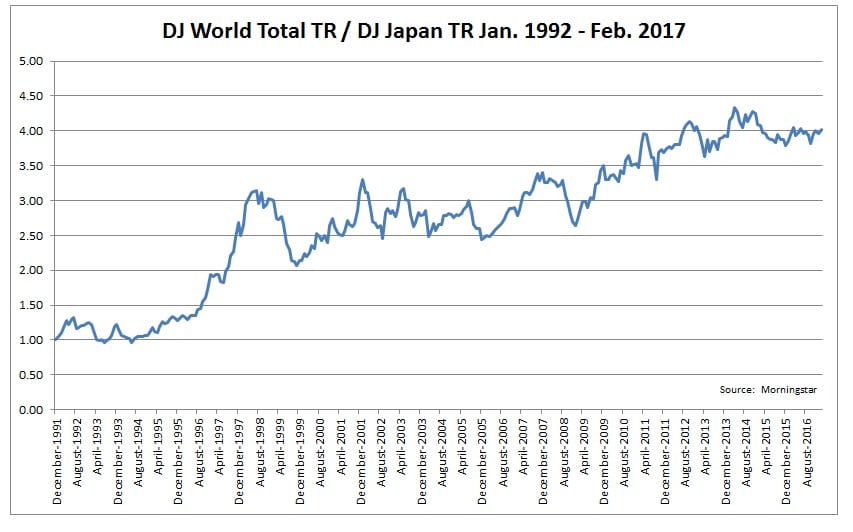For much of the last 25 years, Japanese equities have delivered subpar returns relative to the broader global equity markets:

In fact, from January of 1992 through February of this year, the Dow Jones Japan Total Return index has returned only 1.7% annualized, versus roughly 7.5% for the Dow Jones Global Total Market index.
It is true that a main culprit for this lackluster performance was that by the start of the 1990s, Japan had become one of the largest – if not the largest – equity bubbles of all time. For those who were not alive then, it may be difficult to imagine that by the early 1990s, Japan accounted for some 40% of the global equity market, versus only about 30% for the United States, according to data from Credit Suisse.
One would think that after such a long period of anemic returns that Japanese equities would be bargain-priced relative to the developed world, but, on the surface, that doesn’t appear to be the case:

However, in the case of Japan, valuation analysis must take into account the enormous cash piles on which Japanese corporations are sitting. To put corporate Japan’s cash hoard in perspective, we can look at it as a percentage of market capitalization, which the IMF has calculated using recent data:

(chart via IMF)
Relative to Japanese GDP, Japanese corporate cash stockpiles are even more eye-popping (again, via the IMF):

(chart via IMF)
[Note: The above-cited IMF reports are believed to be the latest analysis of Japan’s corporate cash situation, and there is no evidence that percentages have shifted significantly since 2013.]
Because of these huge cash amounts, and also because of the fact that that cash is earning little or no interest, it is necessary to adjust equity valuation metrics accordingly [Note: Professor Aswath Damodaran has a great post on this, so while I will use his methodology, I will not repeat his comments here.]
We can extrapolate Japan’s current stock market capitalization by using the 2015 World Bank data which reports a value of roughly $4.9 trillion, and multiply that by a factor of about 1.1, based on estimated Japanese equity market performance, and inferring Japanese equity earnings from its trailing twelve-month P/E ratio of 19.4. Based on the IMF data cited above, we can assume that Japanese corporate cash is around 40% of market capitalization. This adjustment for cash reveals that Japanese shares are likely much cheaper than they appear with a cash-adjusted TTM P/E of less than 12:

Furthermore, unlike in the United States where a good portion of non-financial corporate cash holdings is concentrated in a few sectors like information technology, Japanese corporate cash hoarding is commonplace across the board (chart from IMF):

In some ways, this cash hoarding should not come as a big surprise. After all, when it comes to returning cash to shareholders, Japanese firms are among the least shareholder-friendly in the world. In fact, based on 35 years of data gathered by Credit Suisse, Japanese firms have have returned (via dividends and buybacks) the least amount of cash to shareholders:

They are also engaging in far less M&A, and far fewer divestitures, and such a lack of corporate dynamism is, in my opinion, a main reason why Japanese shares have languished for so long after post-bubble valuations have more or less normalized.
In sum, there is little doubt that Japanese shares are cheap, but unlocking their value likely depends on the promise of new reforms and more shareholder-friendly actions. Until those promises are made good, investors may be disappointed.
Disclosure: The results are hypothetical results and are NOT an indicator of future results and do NOT represent returns that any investor actually attained. Indexes are unmanaged, do not reflect management or trading fees, and one cannot invest directly in an index.
This writing is for informational purposes only and does not constitute an offer to sell, a solicitation to buy, or a recommendation regarding any securities transaction, or as an offer to provide advisory or other services by Fortune Financial Advisors, LLC in any jurisdiction in which such offer, solicitation, purchase or sale would be unlawful under the securities laws of such jurisdiction. The information contained in this writing should not be construed as financial or investment advice on any subject matter. Fortune Financial Advisors, LLC expressly disclaims all liability in respect to actions taken based on any or all of the information on this writing.

